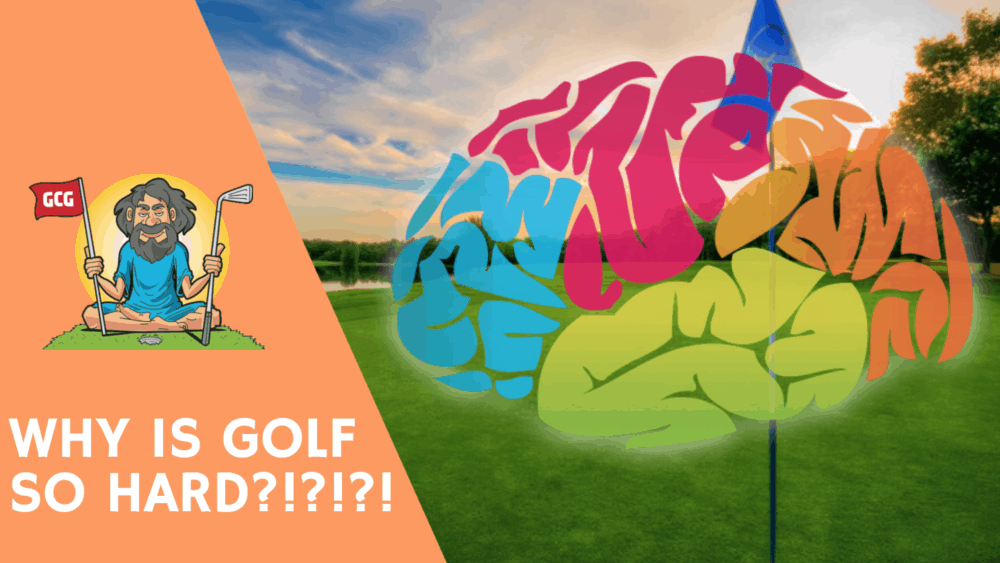Golf is hard. Golf is the hardest sport ever. If you didn’t know that already, then you have probably never played golf.
Have you ever thought about why golf is so hard, though? Every athletic person could pick up baseball pretty easily. Football? Yeah, I feel like I could become an “average football player” in a pretty short period of time. I can catch, I can throw, I can run. Soccer? I’ll be worn out pretty quickly, but I feel like I could fit in pretty well in a competitive game.
What about baseball? Don’t even get me started. My friends and I have had many conversations relating to professional baseball. We all think that we could fill in at a professional baseball game with no one noticing at all. I can swing. I’d get a few fouls for sure. If I strike out, it’s not a big deal. People strike out all the time! I could catch and throw pretty well. Sure I would make mistakes, and obviously I am not saying I am near as good as any sort of professional baseball player, but I could fit in just fine.
You just can’t fake it in golf. When you are bad, you are bad. And everyone knows it.
I’ve come up with four reasons as to why golf is so hard. If you have another theory as to why you think golf is the hardest sport, please leave a comment below. I’d love to hear from you.
There Are So Many Different Aspects of the Golf Game


If you have been playing golf for quite some time, then you know how separate different parts of the golf game can be. One day, you might feel as if you can’t miss a fairway. Another day, every putt within 10 feet is going in without a doubt. The next week, you are striping irons with the best of them. The week after that, you are getting up and down like Phil Mickelson.
Problem is, you can’t put everything together into the same round. You might be on with the driver, but you putt for crap. You might be hitting your irons to within 10 feet consistently, but you don’t make a single birdie because you can’t make a putt. There are simply too many aspects of golf to be good at before you are putting together great scores.
Let’s compare that to baseball. There is batting, and there is fielding. You can work on your batting. And you can work on your fielding, depending on what position you play. Two things.
How about basketball? There is dribbling, shooting, and defense. Three things. If you are good at just two of those things, then you know exactly what else you need to work on to take your game to the next level.
Soccer? Dribbling, passing, shooting, and defense. If you are good at those three things, then you are an incredible soccer player.
In golf, though, there is driving, fairway wood shots, iron ball striking, wedge shots, pitching, chipping, putting, bunker shots, flop shots, recovery shots, etc. You can’t just be great at one or two things and be a great golfer. You have to be at least average at everything, and then you have to excel at multiple things just to be competitive. And if you aren’t good at putting, well you are at a huge disadvantage, because it’ll be hard to go low.
In summary, there are so many things to be good at before you’ll see a number in red. And that doesn’t even get into the mental game at all!
How to use it to your advantage: track your stats. How many fairways are you hitting? How many greens are you hitting? How often are you getting up and down? How many three putts do you have? These are all very important stats that you might or might not keep track of at the moment. Often times, it can be difficult to know exactly where you are losing shots when you play. You might be missing far more greens then you realize. In that case, driving and iron play should be a big focus for you. If you aren’t getting up and down enough, you might need to focus more on chipping and putting. Keep track on a scorecard at least for a round or two so that you can get a numerical representation of your golf round and determine where you should be focusing your practice.
You Have So Much Time to Think


When it comes to nearly every other sport, you are relying on reactions and natural athletic ability. When you are playing ping pong, you are thinking less about technique or mental strategy, and more on staying in the moment and hitting each shot back within the split second that it is coming at you. When you are playing soccer, you are always moving. Everything is happening so quick, you hardly have time to think about anything. Your actions are all coming from previous practice and natural athletic instincts.
On the golf course, though, you have so much time to think about each shot. Each thought that comes into your mind, whether you like it or not, is going to affect your next shot somehow. If a snap hook that you hit long ago on that tee box comes into your mind, you better believe your odds are much lower of hitting a good shot.
When you are walking from tee box to your drive, many things can creep into your mind. You might be thinking about a prior shot that you hit that really messed your good round up. You might be thinking about a swing change that you are trying to incorporate. You might be thinking about why your girlfriend might have left you out of nowhere last month. The point is, you are in control of your thoughts.
How to use that to your advantage: the power of positivity is real. It is proven. I believe in it. Most golf mental coaches do as well. You need to be visualizing the exact shot that you want to hit. You need to be having positive thoughts in your mind about what you are going to do. Tell yourself you are a great ballstiker if you are struggling a little. Remind yourself of the best iron shot you have ever hit.
If you know you do better when you get your mind off of golf, then do whatever it takes to keep your mind elsewhere. Think about or sing a song in your head. I often times have a song stuck in my head during a round, so I’ll sing it to myself when I am walking from shot to shot. Other times, I’ll try to clear my brain as much as possible. This is a great thing to practice. It allows golf to be a huge destresser for me.
Try to learn how you play the best. Are you thinking about your next shot in a positive way? Or do you perform better by keeping your mind off golf and just naturally playing golf without much thought?
The Golf Swing Goes Against Our Natural Instincts


The golf swing is a very complex thing, and it goes against many of our natural instincts. Ben Hogan said it best: “Reverse every natural instinct and do the opposite of what you are inclined to do
To begin with, when we get to the top of the backswing, we all want to hit the golf ball as soon as possible. This would encourage us to get the golf club moving first and really get our arms swinging at the ball as well. This is complete havoc for a golf swing. Swinging the club head first leads to casting the golf club, losing all the lag and decreasing overall distance. Swinging the arms to the ball leads to a very over the top golf swing. This results in cutting across the ball, leading to pulls and slices typically. All of that, just because our instincts tell us to swing the club head at the ball ASAP.
Next, we have impact. To make the golf ball go up in the air with wedges and irons, we actually have to hit down on them. This makes no sense, right? But we all know it’s true and proven. Our natural instincts, however, want to lift or help the ball up into the air. This typically leads to a terrible impact position, where we flip the club and often mishit the ball. The instinct would lead to terrible ball striking if we didn’t fight it and really try our hardest to get in the best impact position possible.
Another area where golf goes against our natural instinct is with putting. It would make sense to swing the putter back in a straight line and then swing with no face rotation at all. This is known as the Straight-back, Straight-through (SBST) method of putting. However, a small arc is actually much more natural. It is much more reliable, and most golfers do it anyway unless they are literally trying their hardest to swing SBST.
Golf is a Game of (Sometimes Embarrassing) Mistakes


People hate making mistakes. When they make multiple mistakes in a row, they will typically quit that task unless they have a good reason not to. People hate not being good at things from the start. The problem with golf is that nearly every shot is a mistake. You are never hitting many shots EXACTLY how you wanted. Sure, it happens here and there, but not often at all.
Typically, you are missing your targets by pretty moderate distances, or you are missing shorts putts, or you are topping drives, or you are duffing chips. The mistakes in golf are typically must more costly and embarrassing than any other sport.
Sure, missing an open goal in soccer is incredibly embarrassing, but that doesn’t happen much. Duffing a chip? That happens all the time. And even pros do it on an occasional basis. Yes, missing a somewhat short field goal wide right is a terrible thing for a football punter. But not nearly as embarrassing as topping a drive off the first tee when people are watching you. Striking out? That’s not good, but it happens all the time! Missing a short 4 foot putt is way more infuriating and embarrassing though.
When it comes to pros, even they are making mistakes all throughout their rounds. Their drives aren’t going exactly where they wanted, their lay ups are a little off, their approach shots fly too long, their chips roll too far, their putts miss right/left. They make mistakes way more than people realize.
The good golfers, though, make mistakes that are manageable. Their mistakes are that their drives go in the rough. A high handicapper’s mistake is that his drive goes out of bounds. Big difference. A top amateur’s mistake is that his chip went 6 feet past the hole. A beginner’s mistake is that his chip was bladed over the green. Again, very big difference.



